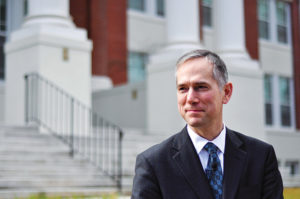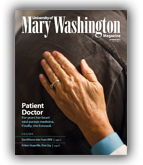
Ambassador Clifford A. Hart entered the diplomatic corps in his early 20s. He has worked in Iraq; Taiwan; and Beijing and Guangzhou, China. He’s also been an adviser to the Navy and the White House.
Photo by Kimmie Barkley ’14
Ambassador Clifford A. Hart ’80 calls his upcoming diplomatic assignment a choice job that any China hand would aspire to.
Starting later this year, Hart will be consul general for Hong Kong and Macau. His fluency in Mandarin and Cantonese will serve him well, and so will the 30 years of State Department experience he brings to the role.
Hart is ready for whatever frustrations his new job may bring, as his most recent position proves. He is wrapping up an assignment as special envoy to the Six-Party Talks, with the challenging task of persuading North Korea to give up its nuclear weapons program.
“The talks themselves haven’t convened since ’08 for a whole bunch of reasons, most to do with North Korea’s misbehavior,” Hart said. But as special envoy since 2011, Hart has worked with China, Russia, Japan, and South Korea to further a shared interest in North Korean denuclearization.
Hart’s interest in the Foreign Service dates to his teen years. He skipped his last year of high school in Virginia Beach to enter college at 17. A year later, he transferred to Mary Washington because of its strong liberal arts offerings and its proximity to Washington, D.C.
His fellow students probably remember him as a fast talker, he said, and as “one of the few guys” on campus at the time, just six years into coeducation.
“It was very useful to be in the minority,” Hart said. It gave him a different perspective and sensitized him to women’s concerns.
After completing a bachelor’s degree in international affairs and Russian studies at Mary Washington, Hart earned a master’s degree in foreign affairs from the University of Virginia. He entered the diplomatic corps while still in his early 20s. “I barely had a pair of long trousers to my name,” he remembered.
Among his eye-opening early postings was a stint in Moscow in the waning years of the Soviet Union. Even under reform-minded Mikhail Gorbachev, the KGB played dirty with American diplomats. They’d enter the homes of vacationing Foreign Service officers and leave freezers unplugged and toilets unflushed.
Hart didn’t personally experience such treatment. But like his colleagues, he had to assume he was monitored all the time – listened to and probably watched.
Other assignments have been a mix of challenge and adventure at home and abroad. He’s worked in Iraq; Taiwan; and Beijing and Guangzhou, China. He’s also been an adviser to the Navy and the White House.
Hart, who was honored in 2010 as UMW Distinguished Alumnus, visited the UMW campus this March and spoke with students. He fondly remembers his own Mary Washington years, especially his instruction from John Kramer, distinguished professor of political science and international affairs. The two remain friends.
Hart was happy to offer advice for UMW students and alumni interested in diplomatic careers.
The Foreign Service doesn’t require a particular major or academic specialty, but Hart recommends a “good, classic liberal arts” course of study, with philosophy, history, the fine arts, and more.
It’s rare to go directly from college or grad school into a diplomatic job. Most new diplomats are in their late 20s or older, Hart said. “Establish some life skills and grow up a little bit,” he advised.
As for the notoriously difficult Foreign Service Officer Test, “If you don’t pass the first time, don’t sweat it,” he said. “Take it again. It doesn’t cost anything.”
